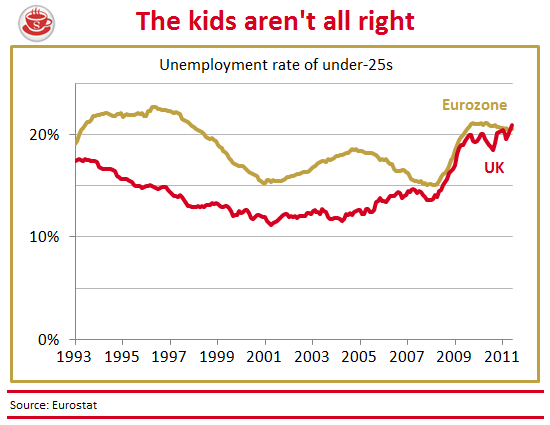Today’s youth unemployment figures are simply appalling. It’s now 21 per cent amongst the under-25s, above the peak of 18 per cent seen under the 1990s recession. For the first time
since then, Britain’s youth joblessness is worse than the European average. This is a tragedy, and not one we should accept as being a grimly inevitable aspect of the recession. Ed Miliband
said in PMQs that a million young people are on the dole: a statistic everyone should get angry about. And we can think of what has gone wrong.

The above graph shows how Britain has nothing left to boast about in unemployment. Blair used to love heading to Brussels and saying the real ‘social model’ was lower regulation which meant higher
employment. What’s changed over the last 20 years? How did we end up with Euro-style levels of youth unemployment? Not by too little state spending, as Miliband suggests. What happened over
these two decades is the re-regulation of the British economy and — specifically — the introduction of the minimum wage. It may have made sense in the boom times, but it has always had
an undeniable negative effect. It’s £6.08 for the over-21s — so it renders unemployable anyone whose skills are worth less than that. You can pay more than they’re worth, it
would be a charitable thing to do. But not many employers can afford to engage in charity.
I was not opposed to the minimum wage when it was introduced. These were post-ERM exit boom years, when labour was in short supply and salaries were rising faster in Britain than in the rest of Europe. But the rate of the minimum wage has increased by 65 per cent, faster than inflation or wages. The Low Pay Commission argued recently that “there is also evidence to suggest that some firms may have coped with minimum wage increases by reducing hours,” and stresses that even though the minimum wage has cross-party support it cannot yet be judged an unqualified success.
I am not saying that the minimum wage is an unqualified failure. Just that youth unemployment in Britain is nearing crisis levels, and we can’t ignore it. Radical action is required. An emergency income tax cut for the low-paid, combined by scrapping the minimum wage for the under-25s, might do something to help. In the Commons, Cameron rightly said that we need a “comprehensive strategy that deals with all of the causes of youth unemployment”. I hope George Osborne’s pre-budget Report next month will deliver it.
UPDATE: Part of the reason behind the consensus on the minimum wage is that anyone opposing it is denounced as wishing for even lower salaries for the most vulnerable. Believe me, I don’t. I just
think that low-paid work is better than unemployment (which can become self-reinforcing). When the minimum wage started, everyone seemed to agree that it didnt cause harm below 50 per cent of the
average wage. But Tim Worstall has found that its 65 per cent for the 18-21
group and 76 per cent for the 16-17 age group. It’s time to ask if the minimum wage policy means unemployment, because those setting the policy wrongly believe they are making those affected
better-off. People tend not to stay on this bottom rung for very long, but the higher we raise the bottom rung the more we risk taking the ladder out of reach.







Comments